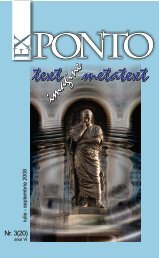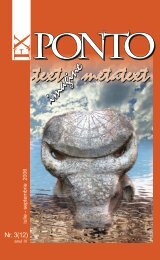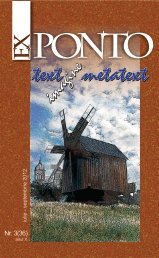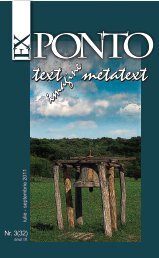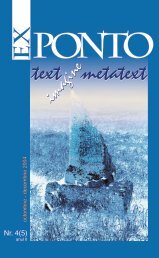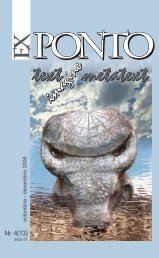Nr. 2 (19) anul VI / aprilie-iunie 2008 - ROMDIDAC
Nr. 2 (19) anul VI / aprilie-iunie 2008 - ROMDIDAC
Nr. 2 (19) anul VI / aprilie-iunie 2008 - ROMDIDAC
You also want an ePaper? Increase the reach of your titles
YUMPU automatically turns print PDFs into web optimized ePapers that Google loves.
Dustbowl growl, the song interminable, inept. Should he<br />
Sing another? The eyes roll their half-hearted yes.<br />
The nurse grits her teeth, stubs out the cigarette.<br />
Although it employs the indirect speech, the sonnet stages Guthrie’s point<br />
of view alternated with the one of the speaker as a classic (i.e., omniscient,<br />
omnipresent) story-teller save for the Dylan character whose own perspective<br />
is opaque to the speaker. In this respect, the syncopated tone and jagged<br />
sentences are so much the more illustrative of Guthrie’s condition, hardly<br />
gasping, with discontinuous reactions and thoughts. But no matter how<br />
impaired, the established musician’s senses and judgment are 100% focused<br />
(for lack of anything else if not for another better reason) on the young, just<br />
emerging, but still awkward artist. This centrality and attention monopolizing<br />
presence of a younger person reminds me of a classical sonnet, written<br />
in a perfect Shakespearian form (– crossed rhymes and a final rhyming<br />
couplet – whereas Wojahn’s one ‘kind of’ sticks to those rules and is perfect<br />
in manipulating the imperfections of the deft inspirational slant-rhymes) – a<br />
sonnet of Shakespeare himself, number 75:<br />
So are you to my thoughts as food to life,<br />
Or as sweet-season'd showers are to the ground;<br />
And for the peace of you I hold such strife<br />
As 'twixt a miser and his wealth is found;<br />
Now proud as an enjoyer and anon<br />
Doubting the filching age will steal his treasure,<br />
Now counting best to be with you alone,<br />
Then better'd that the world may see my pleasure;<br />
Sometime all full with feasting on your sight<br />
And by and by clean starved for a look;<br />
Possessing or pursuing no delight,<br />
Save what is had or must from you be took.<br />
Thus do I pine and surfeit day by day,<br />
Or gluttoning on all, or all away.<br />
If we read Wojahn’s sonnet as a postmodern replica of the Shakespearean<br />
one, or better, a translation of it into the language of fin-de-siècle pop culture,<br />
we could discover relevant correspondences. The nurse may be read now as<br />
the surrounding society that made the Shakespearian speaker fear he could<br />
get “better’d that the world may see my pleasure,” and then the apparent<br />
reluctance of Guthrie to receive or listen to the young Dylan may be interpreted<br />
as a postmodern reenactment of the Renaissance poet’s oscillation between<br />
glutting on the vigorous presence of the younger companion and abstaining<br />
from indulging in such devouring pleasure. The “eyes [that] roll their halfhearted<br />
yes” in the last but one line of Wojahn’s poem speak for themselves<br />
in that very respect. But still, the Guthrie in the latter poet’s sonnet is the<br />
speaker in Shakespeare’s one gone beyond that initial ‘innocent’ vacillation –<br />
the Zeitgeist itself is now one of deep fatigue, lingering malaise and solipsistic<br />
seclusion, so that the Renaissance sensual miserliness clings now only to the<br />
remaining breaths, while the hedonistic gluttony has shrunk meanwhile into<br />
just hardly hearing two songs that echo a possible fulfillment.<br />
Caught -- the bubble<br />
in the spirit level,<br />
Ex Ponto nr.2, <strong>2008</strong><br />
123






